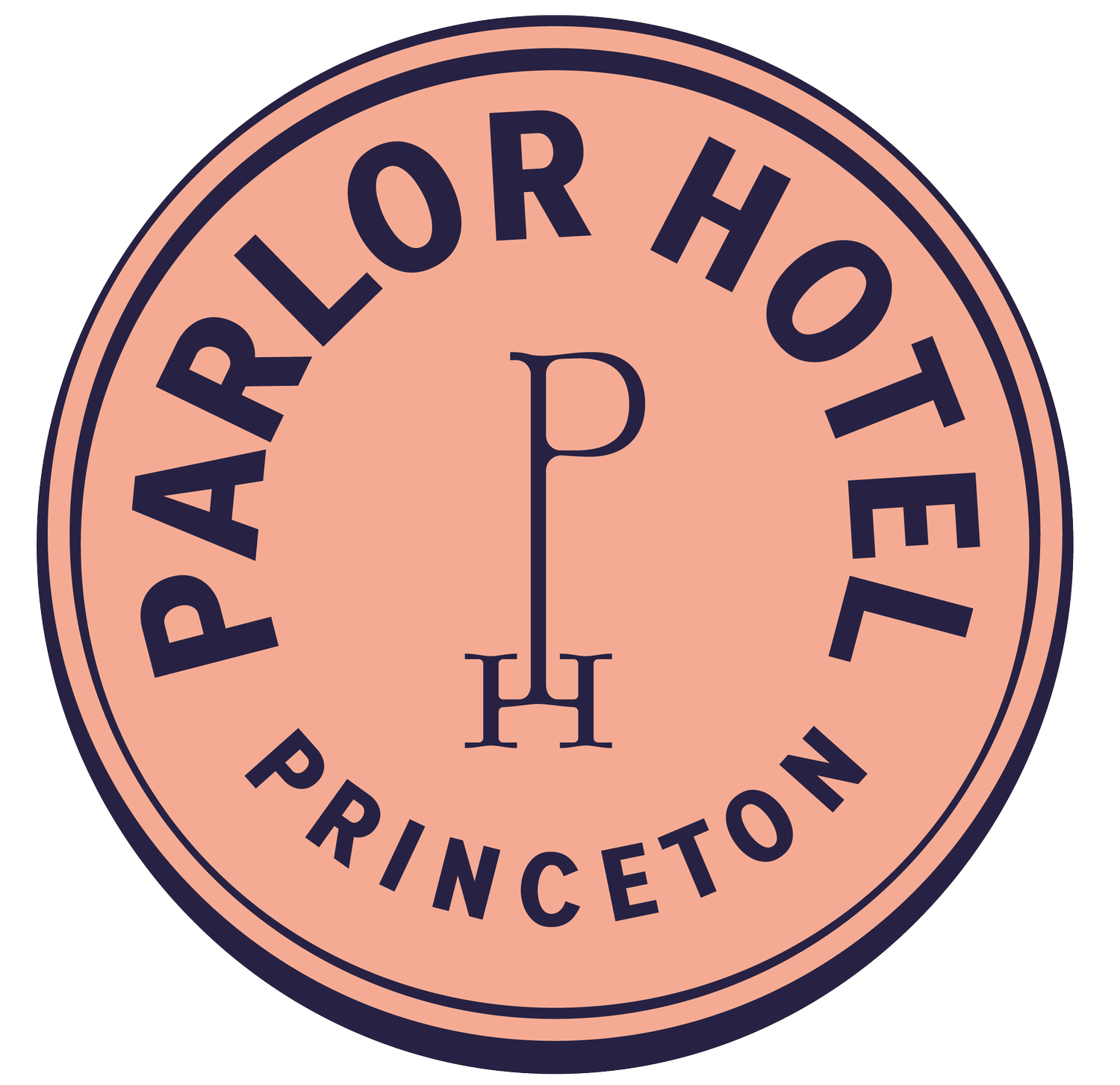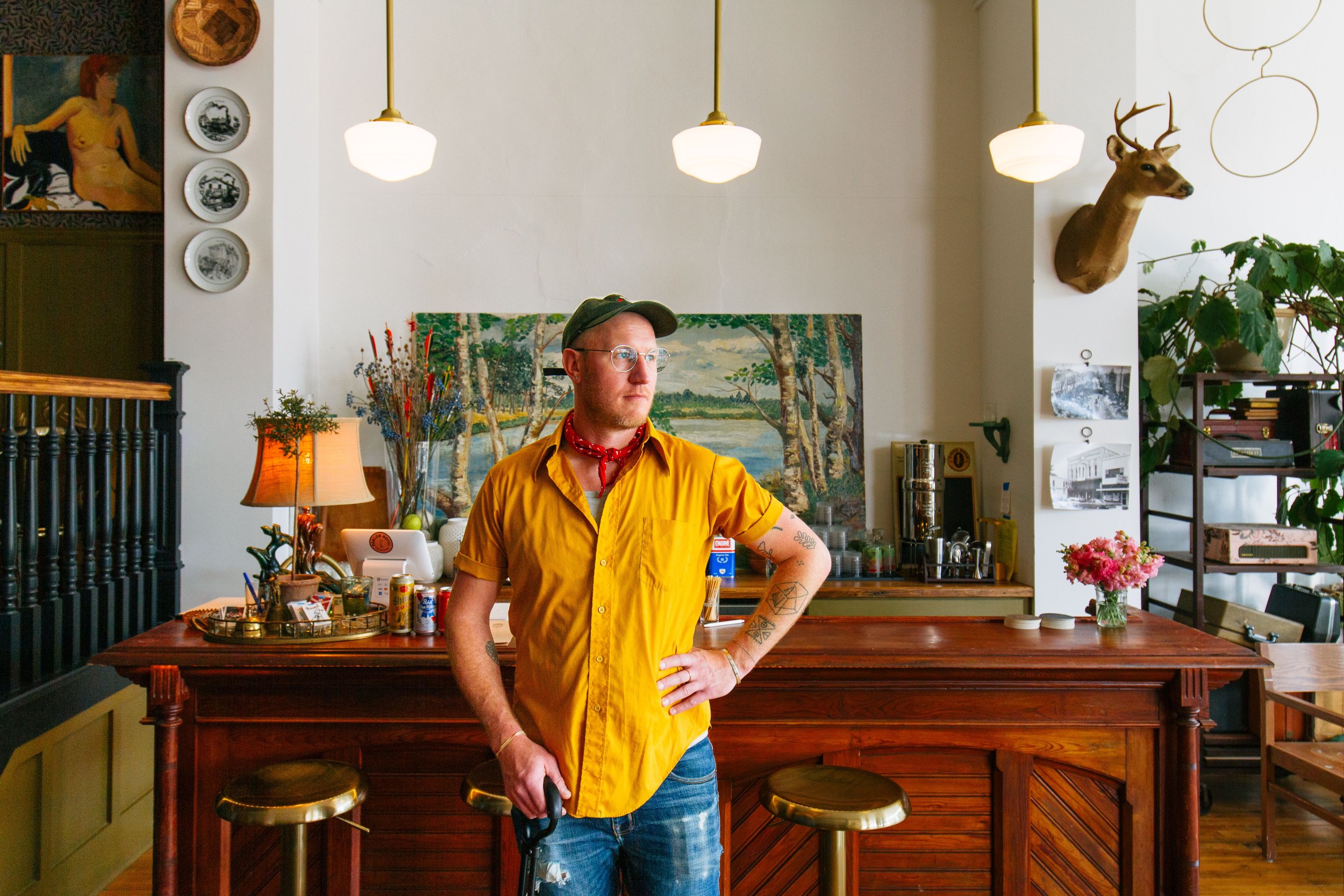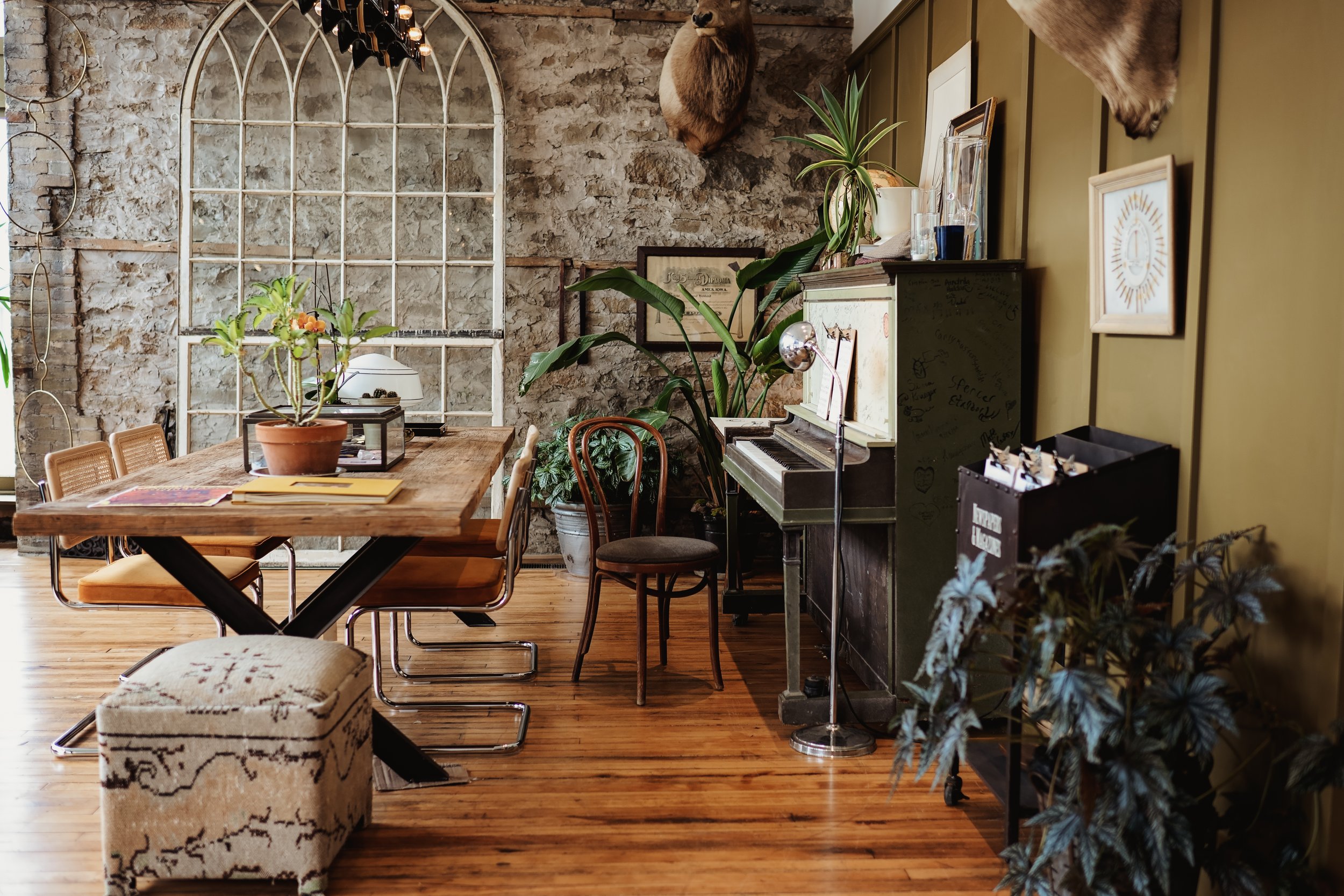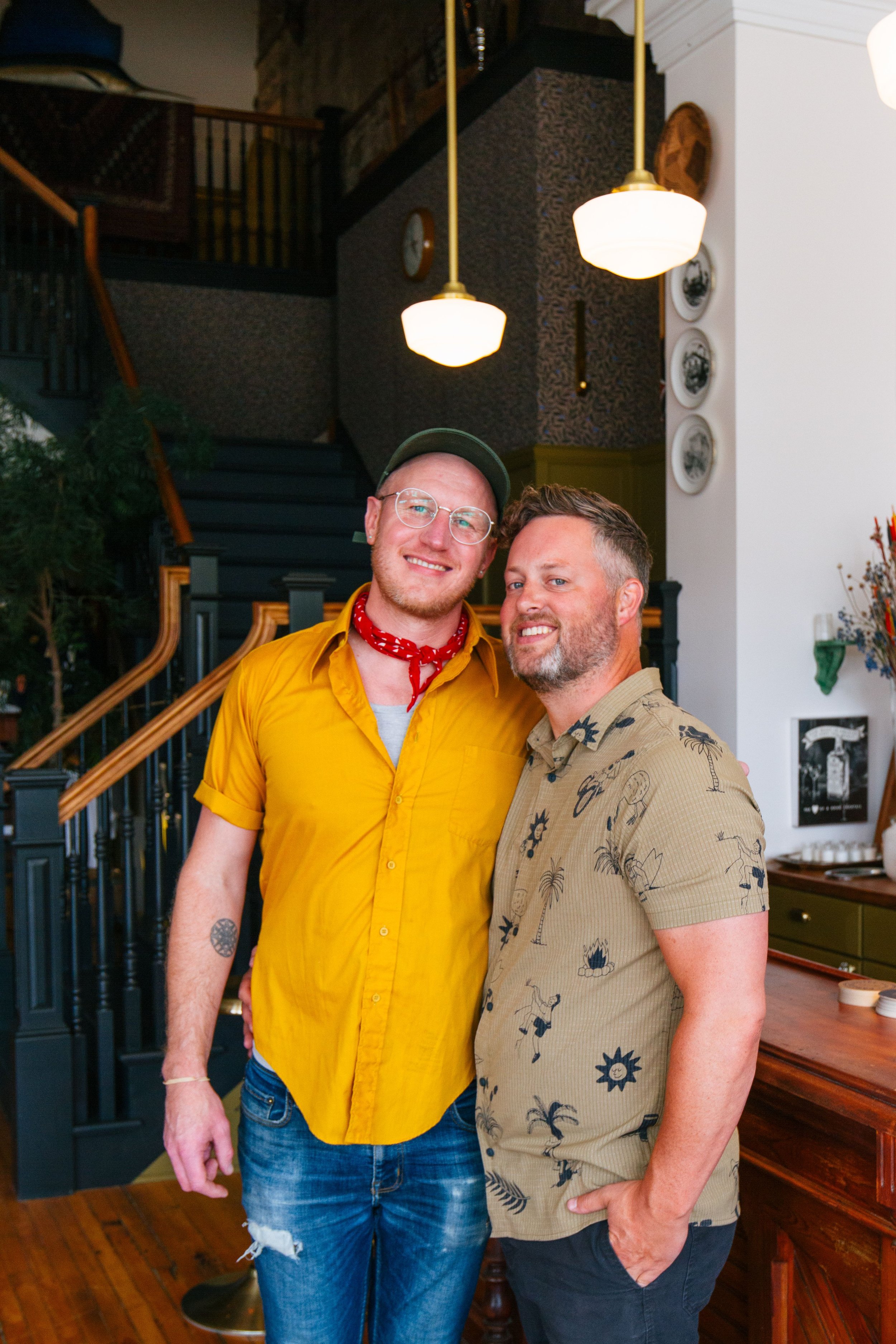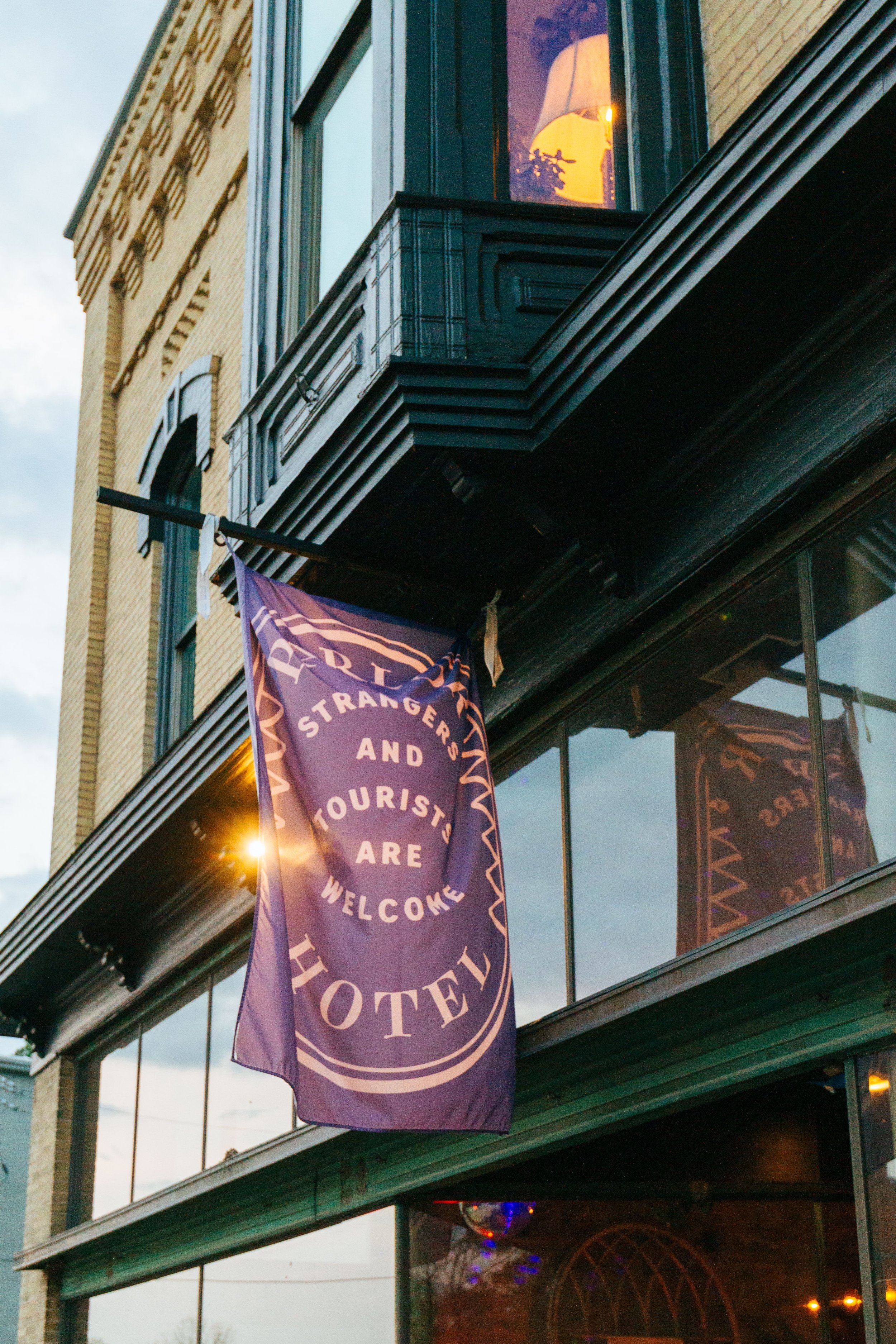
Press
August 16, 2024
Feature Article: Edible Madison
Story by Marissa DeGroot | Photos by Tracy Phillippi | Edible Madison Magazine
“I love the unexpectedness of it,” says Matt Trotter, referring to his pair of business ventures in the heart of a small Wisconsin city of just over 1,000 people.
Trotter is founder and owner of Parlor Hotel and Horseradish Kitchen + Market located in downtown Princeton, less than an hour-and-a-half drive north of Madison. The unexpected nature of his businesses are only the tip of the iceberg of what draws people to this tiny town.
Parlor Hotel is a seven-room inn that is anything but a quick place to crash before hitting the road. It is a space of belonging and becoming, a space to retreat and recharge. What Trotter, along with partner Greg Wright and business partner Alex Pearsall, have created in the 156-year-old, beautifully restored building is an immersive experience and retreat for creatives.
Photo by Andrew Standaert
Uniquely designed rooms, like the Grant—dubbed the “best room in the house”—with its reading nook and soaking tub or the vibrantly colored Remi queen suite, can be individually reserved. For folks interested in a space to host a special celebration, company retreat or reunion, the whole inn is also available to rent. Bringing a group to the Parlor Hotel opens the opportunity for special dinner and breakfast options, opportunities not available to non-hotel guests, at Trotter’s other business venture, Horseradish Kitchen + Market.
A stay at the Parlor Hotel is a launching point to all Princeton has to offer, including the natural beauty of the Fox River that flows through the city, the largest outdoor flea market in the state, and a host of dining options including Horseradish Kitchen + Market. The restaurant, music venue and store is a one-minute walk across the street from the Parlor Hotel, open Friday through Monday.
Horseradish got its start as a food truck, serving up specialty sandwiches and salads out of a small school bus. In 2018, Trotter and Pearsall opened Horseradish Kitchen + Market in Trotter’s hometown, a place that four generations of his family have called home. “It’s been fun for me to see it [Princeton] through fresh eyes,” says Trotter. He and Wright, who both have backgrounds in the arts, have been crucial members of a growing community in Princeton that’s creating a culture of creativity, inclusion and connection—elements that can also be seen throughout the Horseradish menu.
Sandwiches are made with bread from neighboring Renards European Bakeshop and produce is from their friends at area farms, including Boerson Farm and Sandy Fox Farms, with florals grown just down the road at Sugarloaf Gardens. Gluten-free, vegetarian and vegan options abound. The food is not only delicious but also beautiful—just one of the many ways Trotter and his team show care to visitors.
Trotter likens his pair of businesses to a home. “If Horseradish is the kitchen, entertainment space, then Parlor is the living room and bedrooms—someplace cozy to go back to.” And like a home, Trotter and Wright hope visitors feel like family in the spaces they have created— spaces that foster inclusion, creativity and an appreciation of small-town Wisconsin.
Published quarterly with the seasons, Edible Madison focuses on Southern Wisconsin's food and agriculture through the stories of the local farmers, food producers, chefs, food educators and forward-thinking organizations that are behind the region's dynamic local food movement. And we share information about national food and farming issues and topics to keep us all connected to the greater food movement.
March 1, 2023
A RURAL OASIS
Written by Karin Wolf & photographed by Melanie Jones for Our Lives Magazine.
Princeton-raised Matthew Trotter is building a purposefully curated ecosystem that both lifts up his home town’s history and celebrates a queerer version of up-north culture.
LESS THAN AN HOUR AND A HALF NORTH of the Wisconsin State Capitol, between Montello to the west, and Ripon to the east, past a number of Trump signs, a green “Princeton: Population 1267” marker, and a giant chicken atop a shed with the word “Liberty” painted on the side, you will find a surprising host of handsome, Wisco-hip businesses.
The primary visionary behind these hidden gems is Matthew Trotter (Matt to his friends, and no relation to Charlie). Before he made his place, growing up in rural Princeton had some challenges for Trotter. He was different from most of his peers, as he was heavily into art and music. It turns out those are precisely the interests that have made him the success he is today.
For Trotter, as for many creatives, age is just a number, and from a young age he forged friendships with cool people who brought funky businesses to town, places like Twister and Mimi’s, for example, whose proprietors employed and mentored Trotter, valuing him for who he is, since he was 15 years old. Many are familiar with what it feels like to be outside the mainstream during those adolescent years, but as Trotter knows, “It gets better.”
Return to Rural Roots
According to Trotter, his mother thought that of all her four children, he would be the first one to move as far away as possible. Instead, his siblings have all relocated elsewhere, and he is the one who returned home after college to re-establish roots in the area.
Trotter attended UWM where he primarily focused on art and design, beginning with film then exploring fiber arts, jewelry, and graphic design. He studied under esteemed fiber artist, Kyoung Ae Chow, jewelry and metalsmithing professor Yevgeniya Kaganovich, and many other important Wisconsin teaching artists. He learned a lot in Wisconsin’s biggest city, and in 2012 moved back to his hometown to start his first business, a retail store he named Teak & Soxy.
Trotter is somewhat of a contemporary regionalist, using his artistic talent to celebrate the return to rural and to highlight Wisconsin’s agricultural and industrial roots. He makes small town living look highly inviting and effortless—even enviable. He disputes the stereotype that small towns are inhospitable to LGBTQ folks. In the spaces he manages, all are welcome. Trotter’s skilled training, strong sense of place, and close friendships are proving to be a winning combination. The resulting businesses that he has established over the last 10 years (especially with the boost that bringing on new business partners, Alex and Sarah Pearsall, gave them) are a perfectly curated, comfortable, eclectic, and versatile mix of spaces and functions that are tough to describe.
Remember the queer owned and run “Rose Apothecary” in the sitcom Schitt’s Creek? That store could have been inspired by Trotter’s business model. In one scene, Schitt’s Creek character David Rose, played by Dan Levy, explains why he will succeed running a store where others have failed. David boasts that it is because he is, “Someone with faultless taste who understands what people want and need.” The same could be said for Mathew Trotter, though to be clear, he opened his first retail space long before Schitt’s Creek was even a fragment in Dan Levy’s imagination.
To continue borrowing the fictional “Rose Apothecary” as a metaphor for Trotter’s conglomeration of businesses, at one point David Rose’s boyfriend, Patrick Brewer, a character played by Noah Reid, is helping David fill out the paperwork for a loan that calls for a “brief description of the business.” David replies, “It’s a general store, but it’s also a very specific store. It is also not just a store. It is also a place where people can come and get coffee or drinks, but it’s not a coffee shop, nor is it a bar.” He goes on to say, “It’s an environment, and yes, we will be selling things, but it’s more like a branded immersive experience.”
Needful Things
“Branded immersive experience” is a perfect description for Mathew Trotter’s budding emporium which includes retail, food, performance space, and lodging. The combo forms a lux, queer-friendly oasis smack dab in the middle of rural Wisconsin. At 505 W. Water St., Horseradish Kitchen + Market (K+M), Teak & Soxy, and The Merchant Room are a restaurant/summer music venue, retail space, and Airbnb, respectively. They are all on the south side of the road, abutting a horseshoe curve in the Fox River. Across the street, at 544 W. Water St., The Parlor Hotel, is a small, freshly renovated, boutique hotel that can accommodate 16 people for overnight lodging, and far more in the multi-purpose parlor.
Teak & Soxy, the charming retail space Trotter opened in 2012, is now being absorbed into Horseradish K+M, but those who knew Trotter when he began that first business, know the distinction. Now occupying a small white storefront between the restaurant and a neighboring property, the small but mighty Teak & Soxy hits the spot for those who desire aromatic candles and handcrafted goods from independent makers and designers. The merch’s contemporary palettes add to the appeal for people who follow current trends and those whose tastes, preferences, values, and lifestyles lean unconventional.
Horseradish, opened in May of 2018, has a similar lush vibe. What started in 2015 as the cutest little yellow awning-clad food truck serving specialty sandwiches, evolved into a bricks-and mortar-restaurant with a full kitchen when Alex Pearsall came on board and brought with him the Chicago-based architectural firm Filoramo Talsma. As soon as you enter, you are greeted by a distractingly large Jim Dine print of Pinocchio. A striking art collection by a variety of artists abounds, from Manlio Guberti-Helfrich, a highly exhibited Italian modernist, to the works of Wisconsin-connected artists such as Maura Koutoujian, Raphael Salas, and Lauren Paradise (LP), all personal friends or acquaintances of Trotter’s.
Paradise, one of Trotter’s favorite local artists, and one of his many mother figures, lives nearby. She grew up in Italy because her mother worked in Europe as an archaeological restorationist. Some of the most impressive works in the buildings are from Paradise or her mother’s collection. Paradise and Trotter even made collaborative works of various tropical leaves reflective of plants in the space. These simple pieces in which Paradise made the primary gestures and Trotter filled in those outlines with pastels, are cleverly clipped to peg boards and hung above the wainscoting in the dining area.
Scottie, at the front of the house, is credited by Trotter as being “the personality of Horseradish,” serving up what Trotter describes as “lighter, fresher, healthier” fare. Below the counter an old Princeton Population sign says 1504, which is a couple hundred inhabitants higher than the current population, a depopulation trend Trotter would like to see reversed.
Toward the back of the building, the owners opened up the back wall, replacing it with a screened deck and full glass garage doors, unmasking a million-dollar view. From the deck, one can look out at the Fox River and the adjacent nature preserve. By orienting the space toward the Wisconsin wilderness instead of the street, visitors, especially in summer, get what Trotter calls “a huge hit of green.” The porch also includes a small stage where they host a popular summer music series called “Sunday Sessions” from June through August, on Sunday evenings 7 to 9 p.m.
Upstairs, Trotter and his partner live in one apartment, with their dogs Felix, a pit/boxer mix, and Benny, an adorable black lab puppy. On the other side of the hall is a spacious, well-appointed two bedroom (three bed) Airbnb replete with river views, retro modern kitchen, transom windows, functioning vinyl record player, and of course great artwork on the walls along with a collection of photos related to Trotter’s great grandparents’ factory.
His great grandmother, Martha, started knitting wool socks and adding leather soles to them almost 100 years ago. Her slipper socks were eventually sold as Muk Luks. The patent to her design was sold before Trotter was born, leaving him with no stake in the modern day company, but Muk Luks were once big business in Princeton. The knitted footwear looked much like the mukluks of arctic indigenous peoples, which were traditionally made out of caribou or sealskin. Muk Luks original designs mimicked their similar function and appearance in a way that today would be challenged as appropriative. Hopefully, acknowledging this opens a conversation about our colonial legacies and their influences on shaping our current society.
Step Into The Parlor
The night I visited, Trotter and his partner, Greg, were preparing for a Phil Cook concert at The Parlor Hotel. The main floor was set up with an eclectic mix of seating, from a stuffed brown leather couch to 1970s orange lounge chairs with chrome frames, all oriented toward the piano in the front corner. Cook was warming up just as the afternoon’s golden light bounced off a disco ball, creating gumball-sized yellow polka-dots that matched both Cook’s shirt and the mid-century mustard-cushioned dining chairs that made up part of the evening’s ticketed seats. Trotter and I squirreled away on the second floor of the hotel so our conversation would not interfere with Cook who was warming up ahead of his gig.
The Parlor Hotel occupies a former dry goods store that was built in 1868. The rooms are spacious and inviting and hold king and queen beds with fine linens. The architect and design team capitalized on the flooring’s natural patinas when selecting the wallpaper and paint colors. The bathrooms use classic black and white tiles with locally made synthetic marble caps from Elite Marble, Montello. Antlers, vintage objects, old books (grouped by color, of course), and a framed retro bowling score card, are blended with modern conveniences in a seamless fashion. The Parlor Hotel even has a small gym where Trotter plans to add a cross-trainer and other equipment in the near future. A private offshoot from that room has a bodywork table for guests who want to hire an in-house massage therapist for a spa-like experience.
Matthew Trotter, his business partner, and his many friends are bringing new life to Princeton with these community-centered enterprises. The lovely thing about Trotter’s assortment of establishments is that it has everything one could ask for in a “branded immersive experience” including: great arts and culture, a coffeehouse and farm-to-table restaurant, necessities and niceties. It is perfectly located near nature and reflects the area’s rich and complex heritage. For those who seek a taste of nostalgia with au courant design, Horseradish and The Parlor Hotel are a must-visit destination. The pilgrimage to Princeton, from wherever you hail, is well worth the trip. Keep in mind that the concerts sell out and word is spreading about the hotel’s soft opening, so you should probably plan your getaway soon.
Karin Wolf is an arts administrator, freelance arts writer, and consultant. She likes to get deep and try to understand complex art, people, and ideas. Writing about them is her favorite way to do so. She has a M.S. in Curriculum and Instruction from the University of Wisconsin-Madison and undergraduate degrees in History, History of Cultures, and Afro-American History.
